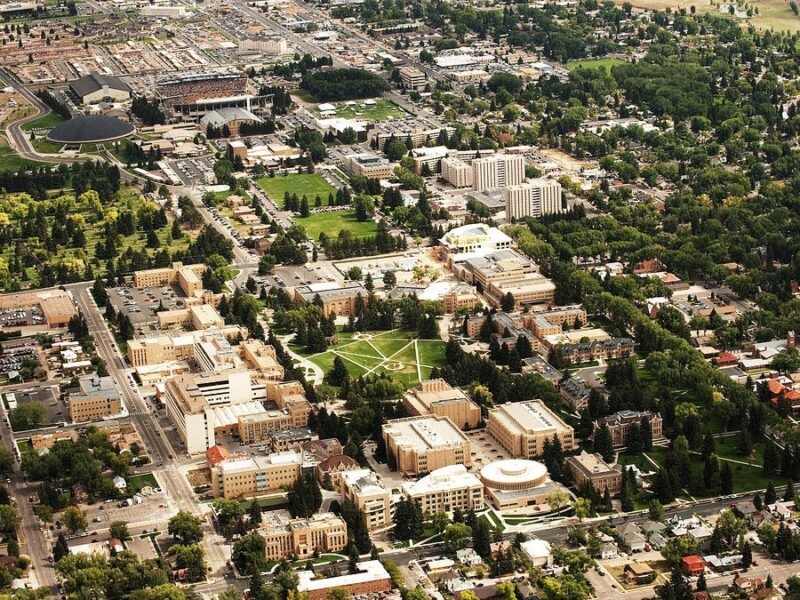University of Wyoming Secures $40.5 Million for Carbon Capture Project in Greater Green River Basin
At least 50 million metric tons of CO2 expected to be collected in first 30 years of operation
- Published In: Other News & Features
- Last Updated: May 18, 2023

The University of Wyoming received $40.5 million -- the largest of nine grants from the U.S. Department of Energy -- to advance the development of carbon dioxide containment and storage facilities. (Courtesy photo from Fine Art America)
By K.L. McQuaid
Special to the Wyoming Truth
The University of Wyoming on Wednesday received the largest of nine grants from the U.S. Department of Energy to advance the development of carbon dioxide containment and storage facilities.
The $40.5 million award from the Office of Fossil Energy and Carbon Management to UW will fund a “commercial large-scale carbon capture and storage hub” in the Greater Green River Basin.
The university’s project will trap carbon dioxide (CO2) from trona mining and other sources and is expected to capture and store at least 50 million metric tons of CO2 in its first 30 years of operation, the U.S. Department of Energy (DOE) announced.
“Thanks to historic clean energy investments, DOE is building out the infrastructure needed to slash harmful carbon pollution from industry and the power sector, revitalize local economies and unlock enormous public health benefits,” said U.S. Secretary of Energy Jennifer Granholm, in a statement.
DOE officials did not provide an exact location or a timeline for development of the project in the Southwestern portion of the state, and university officials could not be reached for comment.
The awards made to companies or institutions in six states are aimed at capturing and storing CO2 emissions, which contribute to global warming and climate change and heighten the severity of droughts, wildfires, rising sea levels, storms and flooding.
President Biden has set a goal of making the U.S. economy one that has so-called “net-zero” emissions of carbon into the atmosphere by 2050.
In all, the DOE awards came to $242.3 million. UW received the highest amount of funding awarded to a single institution, with a $38.15 million grant to the University of North Dakota Energy & Environmental Research Center in Grand Forks, North Dakota, being the second-largest amount awarded.
Awards were also made to companies or institutions in Texas, Georgia, Colorado and Illinois.
Additionally, the DOE provided $9 million in funding to companies in Michigan, Texas and Georgia to perform detailed engineering design studies for the potential development of CO2 pipeline networks.
The studies will develop innovative methods to “efficiently and safely transport captured CO2” from power plants, ethanol facilities and other industrial operations. Captured CO2 could then be transformed into building materials, fuels or chemicals, the DOE stated.
Such pipelines have at times generated the ire of farmers and ranchers throughout the West for taking valuable land.
But Jim Magagna, a Rock Springs rancher and executive vice president of the Wyoming Stock Growers Association, said such pipelines and ranching can co-exist comfortably.
“I’d generally support them,” Magagna said of the carbon capture pipelines. “One of the keys will be the ability to continue to utilize fossil fuels, which is an important part of the economy in Wyoming.”
He added, “There can be challenges with pipelines, but if they’re done properly, I’d have a positive attitude about them. If there’s proper reclamation done, they often create a short-term impact.”
Officials from the Wyoming chapters of the Sierra Club and The Nature Conservancy could not be reached for comment.
DOE also announced it has re-opened and expanded the scope of a potential $2.25 billion in funding to assist in the development of commercial-scale, carbon storage infrastructure, including pipelines.
In seeking a portion of that funding, applicants will have to develop a Community Benefits Plan that details how a project will “advance quality jobs, environmental justice and community partnership,” according to the DOE statement.
Applications are due by July 6.
Since the start of 2021, the DOE has invested over $730 million into advancing the research, development and deployment of various carbon management approaches, including storage and conversion of CO2, the agency stated.













